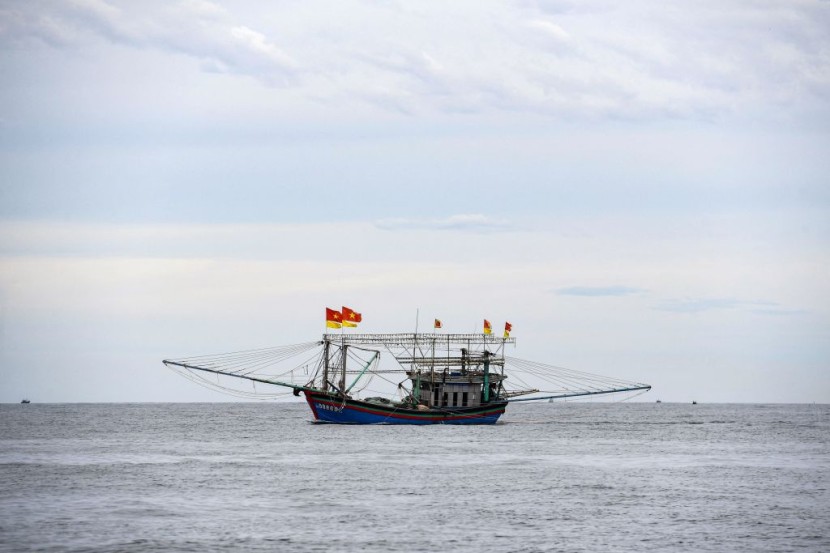
China disregarded Vietnam's exclusive economic zone (EEZ) and sent a research ship and five escort vessels to an energy-rich South China Sea area where a Russian state firm jointly operates a gas tract with Hanoi.
The move is Beijing's latest escalation in the region, following the deployment of a research vessel, at least one Chinese coast guard ship, and nearly a dozen other vessels earlier this month.
China Vessels Enter Vietnam Waters
On Friday, the research vessel Xiang Yang Hong 10 traversed the 04-03 gas block operated by Vietsovpetr, a joint venture between the Russian-owned Zarubezhneft and PetroVietnam.
According to Fox News, the announcement comes one day after Vietnam demanded the Chinese vessel depart the area near the Spratly Islands, which it had entered on May 7.
China has attempted to assert sovereignty over the entirety of the South China Sea, increasing its aggressive posture against neighboring nations with jurisdictional rights in the vast body of water, such as the Philippines, Taiwan, Malaysia, and Vietnam.
After the Chinese vessels crossed block 129, which Vietgazprom also operates, Vietnam issued a rare public statement on Thursday demanding that they vacate the area. In response to queries from reporters, Chinese spokesperson Mao Ning asserted Beijing's sovereignty and jurisdiction over the Spratly Islands and adjacent waters.
International ships are permitted to cross the exclusive economic zones of other nations because they are not the direct territory of any particular sovereign. However, under international law, nations have jurisdictional rights over these zones, granting them special rights regarding exploration, use of marine resources, and energy production.
According to Ray Powell, who heads Stanford University's Project Myoushu in the South China Sea, the Chinese vessel Xiang Yang Hong 10 began operating in Vietnam's EEZ on May 7, representing the most significant incursion since 2019.
The 2019 impasse lasted over three months and primarily targeted a block operated by the Russian state energy company Rosneft at the time. Less than two years later, Rosneft transferred its assets in the South China Sea to the Russian state-owned company Zarubezhneft, which operates some of the gas fields at the center of the current dispute.
South China Sea Chronicle Initiative (SCSCI), an independent non-profit, shared vessel-tracking data with Reuters indicating that in the weeks since May 7, the Chinese research ship, sometimes accompanied by a dozen vessels, has been moving primarily across gas block 04-03, operated by Vietsovpetr, a joint venture between Zarubezhneft and PetroVietnam.
Vietnam Asks China to Withdraw Ships
In addition, it routinely traverses blocks 132 and 131 that Vietnam has licensed to Vietgazprom, a joint venture between the Russian energy behemoth Gazprom and PetroVietnam. China has submitted contending license applications for these two blocks.
The three businesses and the Russian embassy in Hanoi did not respond to requests for comment immediately. In response to a query about the stalemate, Mao Ning, a spokesperson for China's foreign ministry, stated that China had sovereignty over the Spratly Islands and its adjacent waters and jurisdiction over relevant waters.
Ships are permitted to cross other countries' EEZs under international law, but Vietnam and other countries with claims in the South China Sea, including the Philippines and Malaysia, have long viewed China's operations as hostile.
The Vietnamese Ministry of Foreign Affairs and relevant agencies have repeatedly engaged in dialogue with the Chinese side and taken measures in accordance with international and Vietnamese law to protect Vietnam's legitimate rights and interests.
Vietnam requests that Chinese agencies comply with the shared understandings of the two countries leaders, promptly cease all violations, and respect Vietnamese sovereignty, rights, and jurisdiction.
The foreign ministry representative added that the Southeast Asian nation also urged its northern neighbor to strictly implement the Declaration on the Conduct of Parties in the East Vietnam Sea (DOC), maintain peace, cooperation, and development in the maritime area, and contribute to the development of bilateral relations.
Per tuoitrenews.com, the China Maritime Safety Administration under the Chinese Ministry of Transport announced the installation of three light beacons in the Truong Sa archipelago in Vietnam on Wednesday.
According to the Chinese side, the establishment of the light beacons is intended to "ensure safety" for vessels in the region.
© 2026 HNGN, All rights reserved. Do not reproduce without permission.








